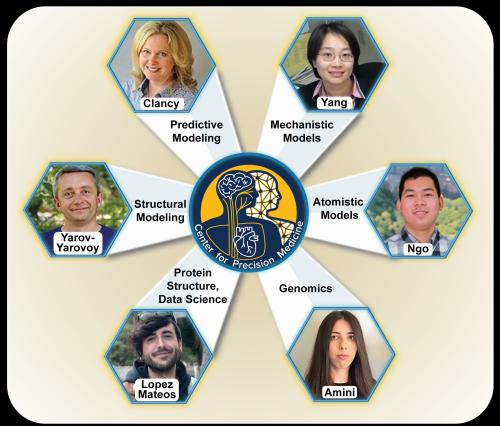Transforming Biomedical Discovery through HPC
Researcher Highlight: Center for Precision Medicine and Data Sciences
The Center for Precision Medicine and Data Sciences (CPMDS) at UC Davis, led by Colleen E. Clancy, PhD (Director) and Vladimir Yarov-Yarovoy, PhD (Associate Director), brings together researchers, including Pei-Chi Yang, PhD, Hajar Amini, PhD, Diego Lopez Mateos, PhD, and Khoa Ngo, PhD to advance computational medicine.

The Center for Precision Medicine and Data Sciences team uses HPC@UCD to study biomedical challenges across multiple scales by integrating molecular modeling, large-scale data analytics, and machine learning. Their work spans from building and simulating large protein systems, such as voltage-gated ion channels, studying how modulators influence their structure and function; analyzing large-scale omics datasets to identify disease-related genes, proteins, and networks; developing predictive AI models that capture the effects of genetic variants; and simulating populations of synthetic cardiomyocytes to model electrophysiological variability and drug sensitivity.
HPC resources enable their studies to be conducted at scale. Deep learning frameworks depend on GPU acceleration to train models on terabytes of synthetic cell simulations. These workflows are not feasible on local workstations but run efficiently at scale on Hive. "Each of these advances would have taken months or been impractical without HPC@UCD." This scale enables the team to move beyond small prototype experiments to clinically relevant predictive modeling.
Collaboration with HPC@UCD staff has been critical to their success. Staff support has helped optimize workflows, configure GPU allocations, and overcome data bottlenecks. Their expertise has accelerated the adoption of new tools and ensured the development of efficient, reproducible pipelines across a wide range of computational methods.
Recent milestones made possible by HPC@UCD include training deep learning models on terabytes of electrophysiology data to predict arrhythmia risk and simulating protein–modulator interactions that reveal new drug mechanisms, and scaling predictive models of genetic variant effects to population-level datasets. These advances are highlighted in publications and preprints.
CPMDS exemplifies how high-performance computing can accelerate biomedical discovery. Combining physics-based simulations with AI enables the exploration of larger systems over longer timescales, thereby advancing drug discovery and precision healthcare.
When asked what advice or tips you would give researchers who are new to using HPC…
For researchers new to HPC, Colleen Clancy, PhD recommends “starting with small test jobs before scaling to larger workflows, learning the basics of SLURM early, documenting pipelines carefully, and taking advantage of available HPC training and support. Reaching out early can save substantial effort and ensure smoother research progress.”
Note: Selected publications and preprints highlighting CPMDS’s HPC-enabled work on cardiac modeling, digital twin development, and molecular simulations of protein–drug interactions are available here: PubMed: 40950065; PubMed: 40658102; PubMed: 39387743; PubMed: 38127314.
